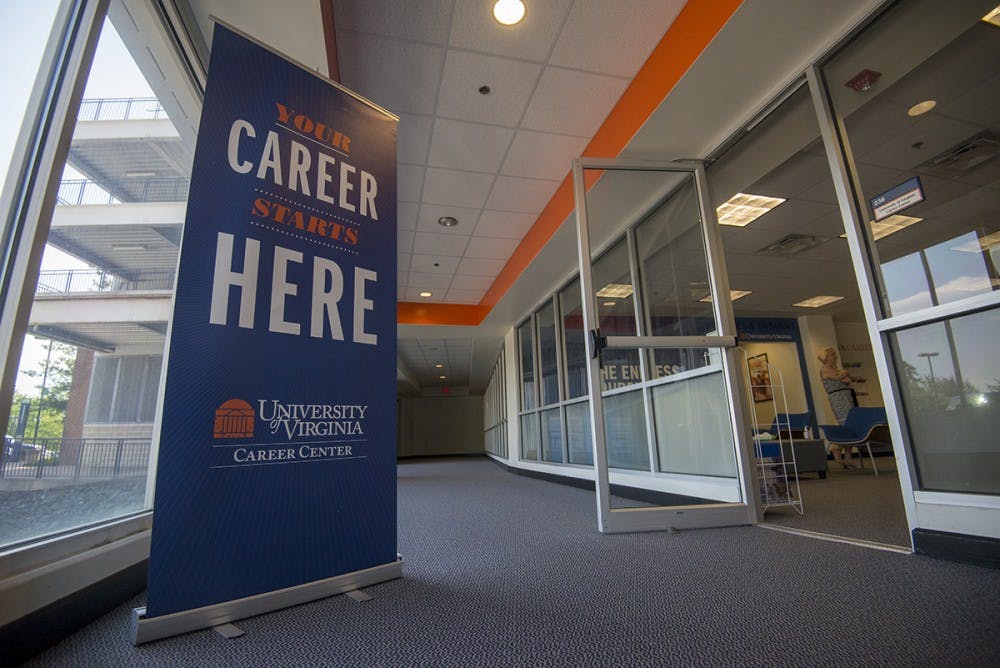Pre-Health Advising, a part of the University’s Career Center, holds weekly advising hours for pre-health students who are in need of advice either on coursework, pre-health application processes or pre-health professions. With only one year of data, it has been found that the students who met with pre-health advisors had a higher success rate for admission than students who never attended advising hours.
Kim Sauerwein, director of Pre-Health and Law Advising, said that Pre-Health Advising supports students interested in nine different pre-health professions — dentistry, medicine, occupational therapy, optometry, pharmacy, physical therapy, physician assistant, podiatry and veterinary medicine. According to data provided by Sauerwein, the national acceptance rate to allopathic medical schools — medical schools offering an M.D. — was 42 percent in the 2016-17 cycle while U.Va. applicants had an acceptance rate of 60 percent in the same cycle.
Sauerwein explained that while the University’s allopathic medical school acceptance rate is 60 percent, their success rate is also dependent on whether or not they met with a pre-health advisor. For example, U.Va. applicants who have never met with a pre-health advisor had a success rate of 32 percent while U.Va. applicants who met at least once had a success rate of 63 percent. University applicants who have met them continuously, for example five or six times, have had a success rate of 73 percent.
Sauerwein accounted for these statistics by noting that staying informed throughout the planning and application process typically leads to higher success rates.
According to Sauerwein, advising sessions are individualized. Some students come in for help with planning their courses while others need assistance finding clinical opportunities. Pre-Health Advising often uses the Pre-Health Candidacy assessment — which consists of three important components of preparation — during their advising sessions to convey to students that academic, career and personal pillars development are all important for the application process. Career pillars focus on clinical experiences, while personal pillars focus on non-quantifiable aspects such as maturity, personal background or work ethic.
“Academic is just one pillar of three pillars that focus on a student’s candidacy,” Sauerwein said. “They need to be able to demonstrate that they have the academic ability to succeed in medical school, or dental school, or PA school but GPA is not everything.”
Sarah Bessey, Pre-Health and Law advisor, said some “career-based” activities that students can engage in include trying to shadow alongside a physician, volunteering at a hospital, volunteering as an emergency medical technician or medical scribing. The timeline of these activities can depend on the student’s interests.
According to Bessey, she uses the phrase “breadth and a depth of an experience,” which she learned from Sauerwein, when students ask what clinical experience they should engage in or which one would look better on an application. By “breadth,” she means having diverse experiences in different types of settings and specialties as a means of broadening one’s perspective. “Depth” can be achieved by spending a “significant amount of time in one setting” to gain a deeper understanding of a particular topic or experience.
Fourth-year College student Nandan Srinivasa, a member-at-large on the Pre-Health Student Leadership Advisory Board, works with pre-health students to help address their concerns. The board collaborates with the pre-health advising office to work with pre-health peers to provide guidance for students who are pursuing admissions to pre-health professions.
Srinivasa says that pre-health advising was helpful for him personally. He said the advising office provided him with guidance for his medical scribe application.
“I do remember speaking with the pre-health advising office and telling them about my intentions to apply to work towards a medical scribe,” Srinivasa said. “They did provide very strong guidance and I believe this guidance helped bolster the application and ultimately allowed me to work in the program.”
According to Bessey, the main goal of Pre-Health Advising is to help individuals make the most informed decisions for themselves. Students can schedule meetings with pre-health advisors through Handshake, or meet with them during walk-in office hours on the second floor of Clemons Library each week 1:30 p.m. to 4:30 p.m. Monday through Thursday.







